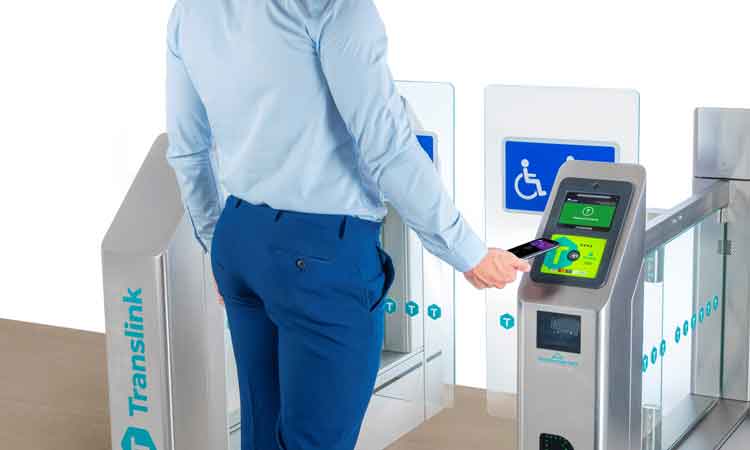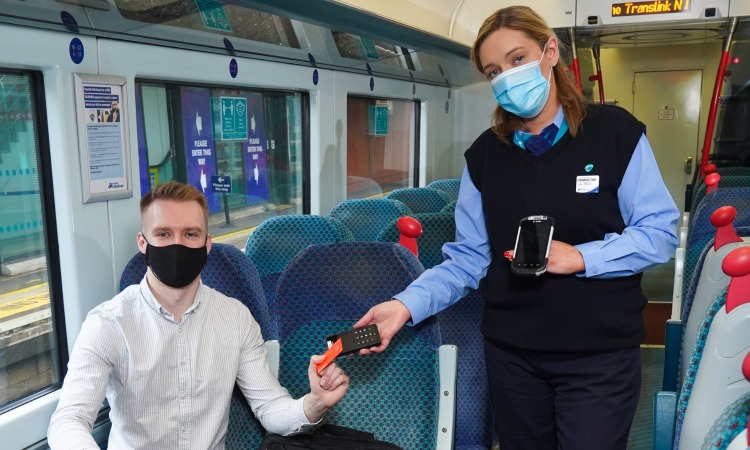Delivering Translink’s Future Ticketing System
- Like
- Digg
- Del
- Tumblr
- VKontakte
- Buffer
- Love This
- Odnoklassniki
- Meneame
- Blogger
- Amazon
- Yahoo Mail
- Gmail
- AOL
- Newsvine
- HackerNews
- Evernote
- MySpace
- Mail.ru
- Viadeo
- Line
- Comments
- Yummly
- SMS
- Viber
- Telegram
- Subscribe
- Skype
- Facebook Messenger
- Kakao
- LiveJournal
- Yammer
- Edgar
- Fintel
- Mix
- Instapaper
- Copy Link
Posted: 24 June 2022 | William McGookin - Translink | No comments yet
William McGookin, Head of Ticketing at Translink, provides Intelligent Transport with exclusive insight into the operator’s roll-out of its new Account-Based Ticketing system, which is set to make travel by public transport in Northern Ireland simpler and more convenient.


As part of its continued transformation of public transport in Northern Ireland, Translink is developing customer-led, innovative ticketing solutions with a focus on ease of use, integration, convenience and value.
When Translink implemented its previous ticketing system in 2001/02, it was one of the first operators in the UK to implement smartcard travel products for both concessionary and fare‑paying customers.
Since then, the original Translink ticketing system has been developed on a phased basis to offer a wide range of personalised and anonymous smartcard products, mobile ticketing, barcode ticketing and other online options.
Upgrading a legacy system
With around 60 million ticketing transactions every year, accounting for almost 85 million passenger journeys in the pre-pandemic period, Translink’s ticketing network acts as the key interface between passengers and services. Therefore, we are taking the mass roll-out of our new ticketing system – right across the business – very seriously.
With around 60 million ticketing transactions every year, accounting for almost 85 million passenger journeys in the pre-pandemic period, Translink’s ticketing network acts as the key interface between passengers and services”
William McGookin, Head of Ticketing at Translink, is leading the programme to deliver Translink’s Future Ticketing System (TFTS) across all Translink bus and rail services. This £42.7 million capital project seeks to upgrade the existing ticketing equipment to deliver a new platform for Translink’s proposed Account-Based Ticketing (ABT) system.
Over the next 18 months, we’ll see the next significant steps on this journey, with roll-out across the entire bus and rail network, resulting in changes to how Translink’s customers travel. The system will gradually migrate to ‘Tap On Tap Off’ (TOTO) travel on all Translink bus and rail services – from the Metro bus network in Belfast and Derry/Londonderry, to Ulsterbus services, Goldline express routes and NI Railways.
Implementing Account-Based Ticketing
This ABT system, akin to what customers may have experienced in London or other major cities, means that customers simply tap on at the start of their journey with a debit or credit card (or a mobile wallet, like ApplePay or GooglePay) or a dedicated Translink smartcard, before tapping off at the end of their journey. At the end of each day, the total fare will be calculated, taking into consideration everywhere that the customer has travelled, and ‘capping’ applied to the fare if any offers or discounts are available on the overall journey.
We want to remove any travel complexity in the minds of our valued customers, facilitating more people to shift to more convenient, ticketless travel”
McGookin and his team are working closely with French company Flowbird and multiple other key suppliers to implement the system over the next 18 months, to ensure a seamless migration for customers from legacy tickets and smartcards to new travel products. “We want to remove any travel complexity in the minds of our valued customers, facilitating more people to shift to more convenient, ticketless travel,” he said.
Accelerated trends as a result of the pandemic
For Translink, like all other public transport operators, COVID-19 has brought its own challenges, where the issue of reducing contact during ticketing transactions came to the forefront.
We are striving further toward less cash in the system, rather than a transition to a completely cashless ticketing proposition”
This is a recognition of a changed reality, exacerbated by the pandemic – while cash fares Translink has successfully trained 240 rail staff on new handheld ticketing devices, which accept contactless payment technology as well as barcode acceptance for online sales. remain important, and are likely to remain so, they represent a consistently decreasing proportion of customer transactions, accounting for 39 per cent of all fares in 2020/21, down from 65 per cent in 2007/08. In the same period, smart ticketing usage has jumped from 28 per cent of all customer journeys to 57 per cent, reflecting the wide range of options and discounts available. However, it is recognised by Translink that the system must be simplified and made easier for public transport users to pay for their travel, in order to further reduce cash acceptance on their services.
McGookin said: “We have a responsibility to ensure social inclusion, and we will still provide options for those who do not have or do not want to use debit or credit cards. On that basis, we are striving further toward less cash in the system, rather than a transition to a completely cashless ticketing proposition.”


Credit: Translink
Supporting both passengers and staff members
The roll-out of TFTS is continuing as part of Translink’s post-pandemic recovery and alongside the ‘Ready for You’ campaign, working to ensure that customers feel safe and secure while using public transport across Northern Ireland.
To further support this, Translink successfully trained 240 rail staff on new handheld ticketing devices, which accept contactless payment technology as well as barcode acceptance for online sales.
Introducing ‘Glider’ – east and west Belfast’s BRT system
The grand plan was seeded with the introduction of the successful Glider service – a Bus Rapid Transit (BRT) system linking east and west Belfast and utilising a pre-pay system with contactless payment options, whereby passengers purchase at a Ticket Vending Machine or tap their smartcard on an on‑platform validator device before boarding the vehicle.
The success of Glider surpassed all of our expectations, as it proved that if you offer an attractive solution which offers simplicity, then people will use it and flock to it”
“The Glider project was complex, as it was the first time that we moved bus ticketing off-board,” McGookin advised. “Our core objectives are simplicity, convenience, speed and integration – these are the cornerstones of this project. The success of Glider surpassed all of our expectations, as it proved that if you offer an attractive solution which offers simplicity, then people will use it and flock to it.”
When the £43 million project is complete, a total of 4,400 new ticketing devices will be deployed across Northern Ireland, with multiple other elements of supporting systems and hardware, and over 2,500 Translink staff trained in their use.
Tap On Tap Off
The ultimate goal is the introduction of the Tap On Tap Off system, available right across the Translink network. The system is currently being trialled on Translink Metro bus services operating to and from the Royal Hospitals in Belfast and George Best Belfast City Airport, as well as the service operating between the Queen’s University and Ulster University campuses.
We want to offer a key message to our customers – simply Turn Up, Tap and Travel”
Following completion of this trial phase, it will be rolled out to all other Metro services, before being implemented on all other bus and rail services over the next 18 months.
According to McGookin, customers will also be provided with several online facilities, such as the ability to top-up their pre-pay smartcards and checking their journey history, payment history and any discounts applied to their account.
“We are really excited about this project,” he said. “We want to start getting messages out to customers, as they increasingly expect contactless travel options, without the need to calculate which fare is best for their journey from a complex range of ticket options. We want to offer a key message to our customers – simply ‘Turn Up, Tap and Travel’.”
Looking to the future
TFTS has a major role to play in Translink’s ambitions to make public transport more attractive in the years ahead, attracting more passengers on board and helping to drive Northern Ireland’s much needed modal shift towards net zero and a sustainable transport future. A modern, efficient ticketing system, coupled with fleet and infrastructure investments, are the key elements for a successful, enriching public transport system, one that will be instrumental in achieving net zero.


Related topics
COVID-19, Passenger Experience, Public Transport, Ticketing & Payments
Issue
Issue 1 2022
Related modes
bus
Related cities
Belfast
Related countries
United Kingdom
Related organisations
Translink
Related people
William McGookin








